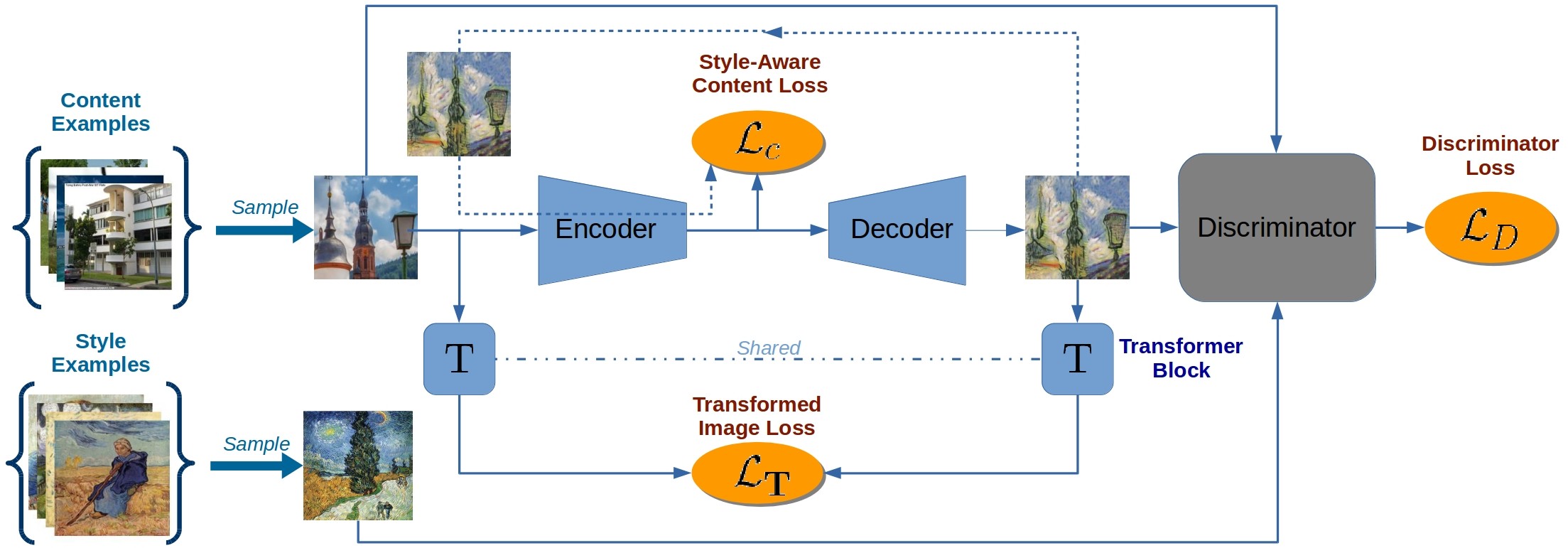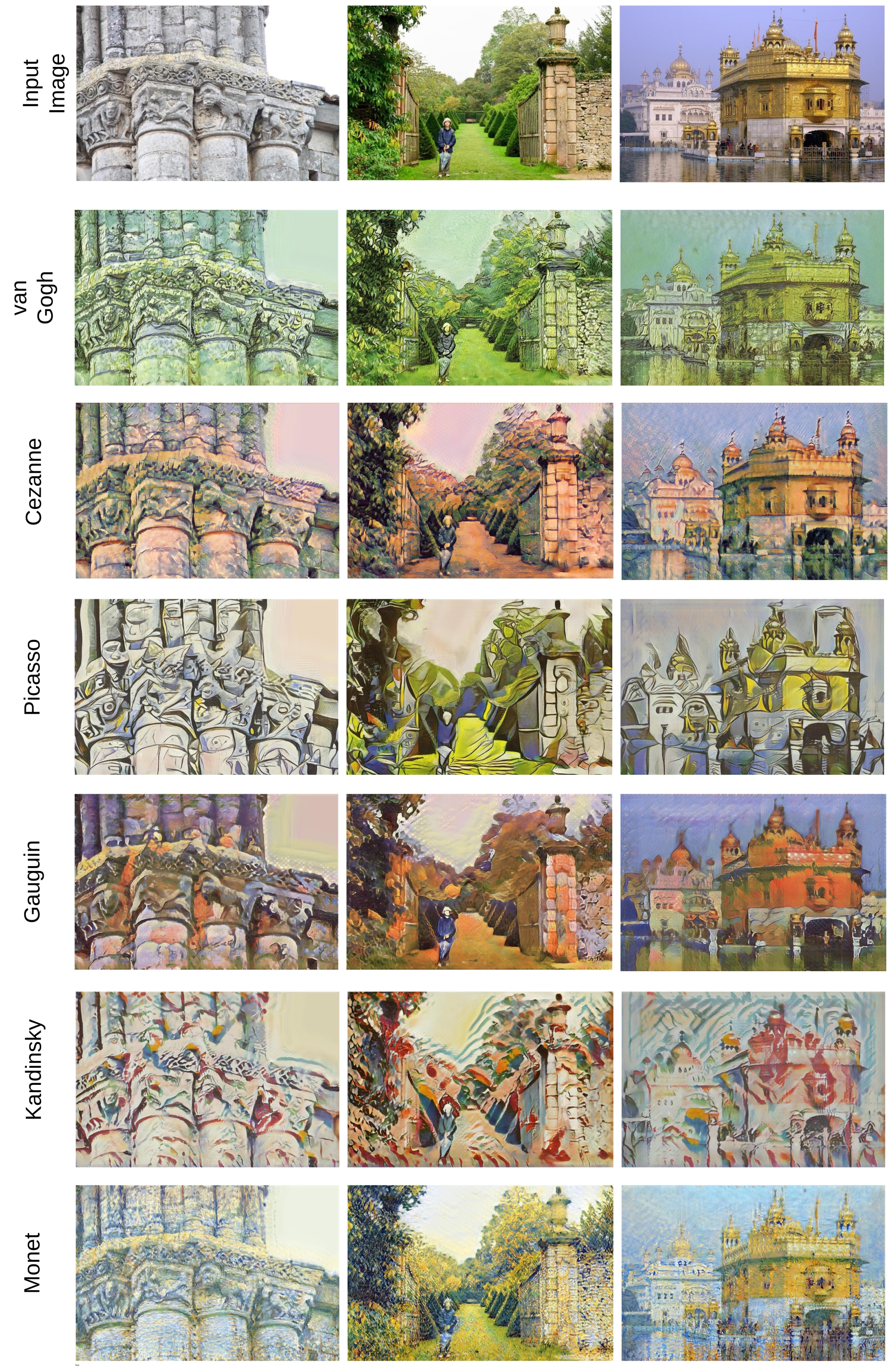Awesome
A Style-Aware Content Loss for Real-time HD Style Transfer
Artsiom Sanakoyeu*, Dmytro Kotovenko*, Sabine Lang, Björn Ommer, In ECCV 2018 (Oral)
Website: https://compvis.github.io/adaptive-style-transfer
Paper: https://arxiv.org/abs/1807.10201

 Please click on the image for a high-res version.
Please click on the image for a high-res version.
Requirements
- python 2.7
- tensorflow 1.2.
- PIL, numpy, scipy
- tqdm
Also tested in python3.6 + tensorflow 1.12.0
Inference
Simplest van Gogh example
To launch the inference on van Gogh style:
- Download the pretrained model model_van-gogh_ckpt.tar.gz
- Download sample photographs.
- Extract the model to
./models/folder and sample photographs to./data/folder. - Run the following command:
CUDA_VISIBLE_DEVICES=0 python main.py \
--model_name=model_van-gogh \
--phase=inference \
--image_size=1280
Stylized photographs are stored in the folder ./models/model_van-gogh/inference_ckpt300000_sz1280/
Additional settings
--ii_dir INPUT_DIR- path to the folder containing target content images.
You can specify multiple folders separated with commas (don't use spaces!).--image_size SIZE- resolution of the images to generate.--save_dir SAVE_DIR- path to the output dir where the generated images will be saved.--model_name NAME- the name of the model (all model should as subfolders in./models/).
Usage example (inference):
CUDA_VISIBLE_DEVICES=0 python main.py \
--model_name=model_van-gogh \
--phase=inference \
--image_size=1280 \
--ii_dir ../my_photographs1/,../my_photographs2/ \
--save_dir=../save_processed_images_here/
If your GPU memory is not large enough, set the variable CUDA_VISIBLE_DEVICES="" to use CPU.
Pretrained models
We provide pretrained models for the following artists:
Paul Cezanne,
El-Greco,
Paul Gauguin,
Wassily Kandinsky (Василий Кандинский),
Ernst Ludwig Kirchner,
Claude Monet,
Berthe Morisot,
Edvard Munch,
Samuel Peploe,
Pablo Picasso,
Jackson Pollock,
Nicholal Roerich (Николай Рерих),
Vincent van Gogh.
Download pretrained models: link.
Extract models to the folder ./models/.
Training
Content images used for training: Places365-Standard high-res train mages (105GB).
Style images used for training the aforementioned models: [download link](https://
cloud.iwr.uni-heidelberg.de/index.php/s/NcJj2oLBTYuT1tf).
Query style examples used to collect style images: query_style_images.tar.gz.
- For example, Vincent van Gogh style: vincent-van-gogh_road-with-cypresses-1890.tar.gz.
This is the dataset representing a particular artistic period of Vincent van Gogh and was automatically collected using "Road with Cypress and Star, 1890" painting as query.
- Download and extract style archives in folder
./data. - Download and extract content images.
- Launch the training process (for example, on van Gogh):
CUDA_VISIBLE_DEVICES=1 python main.py \
--model_name=model_van-gogh_new \
--batch_size=1 \
--phase=train \
--image_size=768 \
--lr=0.0002 \
--dsr=0.8 \
--ptcd=/path/to/Places2/data_large \
--ptad=./data/vincent-van-gogh_road-with-cypresses-1890
Evaluation
How to calculate Deception Score and where to download artist classification model is described in evaluation.
Video stylization
To stylize a video you can use the following script:
# split video on a set of frames
ffmpeg -i myvideo.mp4 -r 25 -f image2 image-%04d.png
CUDA_VISIBLE_DEVICES=0 python main.py \
--model_name=model_van-gogh \
--phase=inference \
--image_size=1280 \
--ii_dir=input \
--save_dir=output
# reassemble the video back from frames:
ffmpeg -i image-%04d_stylized.jpg kktie-out.mp4
Reference
If you use this code or data, please cite the paper:
@inproceedings{sanakoyeu2018styleaware,
title={A Style-Aware Content Loss for Real-time HD Style Transfer},
author={Sanakoyeu, Artsiom and Kotovenko, Dmytro and Lang, Sabine and Ommer, Bj{\"o}rn},
booktitle={Proceedings of the European Conference on Computer Vision (ECCV)},
pages={698--714},
month = 10,
year={2018}
}
Copyright
Adaptive Style Transfer
Copyright (C) 2018 Artsiom Sanakoyeu, Dmytro Kotovenko
Adaptive Style Transfer is free software: you can redistribute it and/or modify
it under the terms of the GNU General Public License as published by
the Free Software Foundation, either version 3 of the License, or
(at your option) any later version.
This program is distributed in the hope that it will be useful,
but WITHOUT ANY WARRANTY; without even the implied warranty of
MERCHANTABILITY or FITNESS FOR A PARTICULAR PURPOSE. See the
GNU General Public License for more details.
You should have received a copy of the GNU General Public License
along with this program. If not, see <https://www.gnu.org/licenses/>.